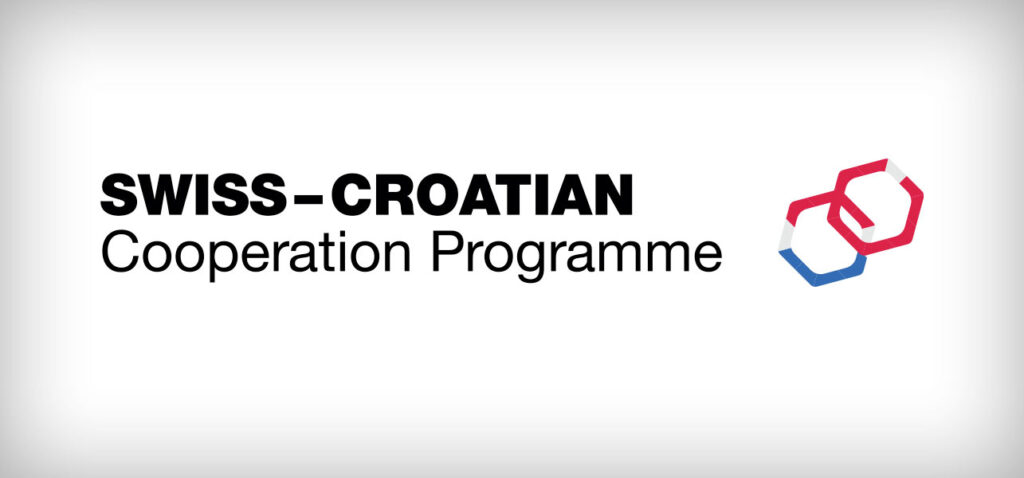

COOPERATION
One of the Foundation’s goals is to enable scientists to enhance their inter-institutional, cross-sectoral and international mobility, coordinate research funding and enhance the connections between the scientific, economic and social sectors not bounded by national borders. This includes activities aimed at supporting competitive scientific projects implemented by research teams that managed to set up influential international collaborations in Europe and rest of the world, as well as actively encouraging Croatian scientists and institutions to participate in European scientific associations and organizations.
Multilateral Academic Projects - MAPS
The Framework Agreement on the implementation of the second Swiss Contribution for the period 2019-2029 between the Republic of Croatia and the Swiss Confederation was signed on 18 October 2022, whereby CHF 45.7 million of grants was made availabe to Croatia for the period until 2029.
One of the four programmes that will be financed within the Second Swiss Contribution will be Research Programme Croatia, with two programme components – Multilateral Academic Projects and EUROSTARS.
MAPS will be implemented through Joint Research Projects (JRPs) that are aimed at promoting collaborative projects with clearly defined goals, involving one applicant based in Switzerland and two to five additional applicants in two to five different participating EU-13 countries (Bulgaria, Croatia, Hungary, Poland or Romania).
The Call was launched in April 2024 with 1 July 2024 as the submission deadline. Projects are expected to start in spring 2025.

Bilateral and multilateral cooperation - WEAVE
The Croatian Science Foundation signed the Multilateral Lead Agency Agreement, which enables Croatian scientists to apply to calls of other funding agencies who signed the MLA Agreement. The Agreement is implemented in the form of a Lead Agency Procedure, which means that one agency conducts the application and evaluation procedure from start to end, i.e. proposals need not be submitted to two different places.
In December 2020, twelve national research funding organizations from eleven countries, with the support of Science Europe, launched Weave, a cross-European initiative to fund and support excellent international research projects. It is the first time a large network of this scale has developed an initiative of this kind to enable bilateral and trilateral scientific cooperation in Europe.
Weave aims to simplify the submission and selection procedures of collaborative research proposals involving researchers from up to three European countries or regions with a single evaluation. It makes use of existing national or regional funding programmes, through which research projects will be financed. It seeks to make it easier for researchers to collaborate across borders. It also ambitions to increase the capacity of researchers to freely determine the composition, focus, and content of their projects.
Within the Weave initiative, the Foundation is currently implementing calls in collaboration with the Slovenian Research Agency (ARRS) – Slovenian-Croatian Bilateral Projects (IPS), the Swiss National Science Foundation (SNSF) – Swiss-Croatian Bilateral Projects (IPCH), the Czech Science Foundation (GAČR) – Czech-Croatian Bilateral Projects (IPCZ) and the German Research Foundation (DFG) – German-Croatian Bilateral Projects (IPDE).
ERA-NET Cofund in Quantum Technologies (QuantERA)
The QuantERA ERA-NET Cofund in Quantum Technologies consortium is a network of 32 national/regional organisation for funding research from 26 countries funding international research projects in the field of quantum technology. The Consortium is co-funded from the EU’s Horizon 2020 programme. The goal of QuantERA is spreading scientific excellence in the European Research Area with special emphasis on the participation of research groups from new EU member states.
The Croatian Science Foundation joined the QuantERA consortium in 2018 and participated in the second QuantERA Call, which was open from November 2018 to February 2019 (Quantera-2019).
The QuantERA consortium has secured additional funding through the new Horizon Europe Framework Programme. In 2021, another transnational call was launched, with 39 projects selected for financing. One of these projects includes a Croatian research team, funded by HRZZ.
Another 24 consortia were funded through the QuantERA-2023 Call, including one research team from Croatia, which is also the Consortium Coordinator.
ERA-NET Cofund on Blue Bioeconomy (BlueBio)
In late 2019, the Croatian Science Foundation became a partner in the consortium within the ERA-NET Cofund in Blue Bioeconomy – Unlocking the Potential of Aquatic Bioresources (BlueBio Project), replacing the Ministry of Science and Education in this role. The Consortium is co-funded from the EU’s Horizon 2020 programme. The BlueBio Project comprises of 28 partners from 17 European countries (Belgium, Croatia, Denmark, Estonia, Finland, Germany, Greece, Iceland, Ireland, Italy, Malta, Norway, Portugal, Romania, Spain and Sweden). The aim of the BlueBio project is to ensure sustainable and competitive blue economy throughout Europe. In addition, the aim is to develop knowledge on value chains in blue bioeconomy, encouraging the application of research results, innovations and demonstrations of bioproducts in production through a multi-shareholder approach. The BlueBio Project shall contribute to the production of safe, nutritious and quality bioproducts and services. The BlueBio Project publishes calls whose aim is to attract projects that explore the use and added value of aquatic biomass in integrated value chains, from primary production via processing to the ultimate production of innovative products and services in the area of bioeconomy. At the first joint Call (2018), the member states secured EUR 19 million for projects, while the European Commission secured an additional EUR 6 million. HRZZ funds two research teams from Croatia that are part of transnational consortia awarded funding through BlueBio’s calls.
Collaboration of Humanities And Social Sciences in Europe (CHANSE)
The Croatian Science Foundation is part of the consortium HERA-NORFACE ERA-NET CO-FUND (Humanities in the European Research Area and New Opportunities for Research Funding Agency Cooperation in Europe), which is composed of 27 research funding organizations from 24 European countries, funding research in the area of Social Sciences and Humanities and coordinated by the Polish National Science Centre (NCN). When applying for additional funds within the Horizon 2020 Framework Programme, this ERA-NET programme was renamed to CHANSE. Transnational Call for Proposals “Transformation: Social and Cultural Dynamic in the Digital Age” was launched in March 2021. Two Croatian research teams participate in consortia that have been awarded funding through this Call.
In 2023, two separate calls were launched – one for researchers in Social Sciences (Enhancing well-being for the future – NORFACE-2023) and one for researchers in the Humanities (Crisis – Perspectives from the Humanities – HERA-2023).
Trans-Atlantic Platform for Social Sciences and Humanities (T-AP)
More information available at: https://transatlanticplatform.com/.
Cooperation Programme with Croatian Scientists in Diaspora "Research Cooperability"
The Cooperation Programme with Croatian Scientists in Diaspora “Research Cooperability” is a programme financed from the European Social Fund in the framework of the Operational programme “Efficient Human Resources 2014-2020”.
The aim of the “Research Cooperability” Programme is transfer of knowledge and attracting investments into the Croatian science and technology system, and indirectly into the economy as well, by means of collaboration between Croatian-based scientists and scientists of Croatian nationality or origin who live and work abroad. Such collaboration would enhance their networking activities, with special emphasis on career development of early-career researchers. In addition, it is intended to develop and strengthen their capacities for participation in calls of European and international organisations.
The Call published within the “Research Cooperability” Programme provides for the implementation of joint research projects in the period from 1 October 2019 to 31 May 2023 at the latest and recruitment of at least two full-time young researchers (one doctoral student and one post-doctoral researcher or doctoral student).
The Programme’s highest body is the Steering Committee, which is responsible for the management, coordination and successful implementation of the Programme and for recommending project proposals for funding. Steering Committee members were elected on the basis of a public call for nominations.
The Steering Committee is made up of the following members:
– Dr. sc. Tanja Šegvić Bubić, Institute of Oceanography and Fisheries, Split
– Izv. prof. dr. sc. Vesna Boraska Perica, Faculty of Medicine, University of Split
– Prof. dr. sc. Mirjana Čižmešija, Faculty of Economics, University of Zagreb
– Dr. sc. Robert Vianello, Ruđer Bošković Institute
– Prof. dr. sc. Bruno Zelić, Faculty of Chemical Engineering and Technology, University of Zagreb
Call PZS-2019-02
The Call within this Programme was open from 03 January 2019 to 28 February 2019. A total of 75 project proposals were submitted. Project proposals that passed the administrative check were referred to the Steering Committee. Based on the nature of the submitted proposals, the Steering Committee nominated evaluation panels, which were appointed by the Board of the Foundation. Nine panels were formed in total, with each panel comprising of at least three members, who were not compensated for their work. The evaluation panels nominated peer reviewers for each proposal.
Peer review was conducted according to pre-defined criteria, which were published within the Call. Each project proposal needed to be assessed by two peer reviewers. During the final evaluation, evaluation panels assessed only those proposals which received two positive reviews and were asked to provide an explanation as to why a negatively assessed proposal would not be recommended for funding. The panel members read all reviews, assessed the project proposals’ work and financial plans, considered ethical issues, organizational support and additional documentation.
All project proposals that received two positive reviews and were awarded mark A by the panel were ranked according to the points they were awarded by the peer reviewers. Taking into account the available funds and the total requested amount from all received proposals, the percentage of proposals that may be financed was calculated. This percentage was then applied to each individual panel.
Monitoring funded projects
The Organization and the Principal Investigator submit quarterly reports on the implementation of project activities to the Foundation, which serve as the basis for reimbursement of funds, while they also submit annual reports on the scientific progress of the project, which are assessed by evaluators. During project implementation, every project will be the subject of an on-the-spot-check, which will be used to further assess the progress and activities of the project.
For any additional information, please contact znanstvena.suradnja@hrzz.hr.
Promoting Excellence in Higher Education - Tenure Track Pilot Programme
The goal of the programme is to support the establishment of the career of excellent young researchers in setting up an independent research group and acquiring conditions and skills for future employment. Such a Programme for excellent young scientists is a new model of career development based on clear and internationally competitive and comparable merit-based criteria. The Programme is implemented in collaboration with École Polytechnique Fédérale de Lausanne (EPFL). The Call was open from 3 April to 3 July 2018. A total of 20 project proposals were submitted. Three projects were selected for funding.
Total budget of the Programme: CHF 4,700,000
– Swiss contribution: CHF 4,000,000 (85.11%)
– Croatian national co-financing: CHF 700,000 (14.89%)
Programme documents:
– Project Agreement concluded on 03 May 2017 between the Swiss Agency for Development and Cooperation (SDC) and the Ministry of Regional Development and EU Funds
– Project Implementation Agreement for the “Promotion of Excellence in Higher Education– Tenure Track Pilot Program” (No.: 04-MU-U-0039/18-21), concluded on 27 March 2018 between the Ministry of Regional Development and EU Funds, the Ministry of Science and Education and the Foundation
– Collaboration Agreement for the implementation of TTPP, concluded on 16 April 2018 between EPFL and the Foundation.
Bodies implementing the Programme/Contact information
Executive Agency:
The Croatian Science Foundation
Department for International Programmes and Funds
Ilica 24, 10000 Zagreb
Intermediary Body:
The Ministry of Science and Education
Directorate for Science and Technology
Donje Svetice 38, 10000 Zagreb
National Coordination Unit (NCU):
The Ministry of Regional Development and EU Funds
Miramarska cesta 22, 10000 Zagreb
Croatian-Swiss Research Programme (CSRP)
The CSRP finances joint research projects in the total amount of CHF 400,000 for the period of three years. Joint research projects are implemented through collaboration of a Swiss Principal Investigator and Croatian Principal Investigator. The Call was open from 9 October 2017 to 19 January 2018. A total of 111 project proposals were submitted. After international peer review, 11 JRPs were selected for funding.
Total budget of the Programme: CHF 4,670,000
– Swiss contribution: CHF 4,000,000 (85.7%)
– Croatian national co-financing: CHF 670,000 (14.3%)
Programme documents:
– Project Agreement concluded on 10 July 2017 between the Swiss Agency for Development and Cooperation (SDC) and the Ministry of Regional Development and EU Funds
– Memorandum of Understanding for the Implementation of CSRP, concluded on 7 October 2017 between the Swiss National Science Foundation and HRZZ
– Agreement on the division of duties and responsibilities for monitoring and funding the implementation of “the Croatian-Swiss research programme”, concluded on 27 March 2018 between the Ministry of Regional Development and EU Funds, the Ministry of Science and Education and HRZZ.
Bodies implementing the Programme/Contact information:
National Coordination Unit (NCU):
The Ministry of Regional Development and EU Funds
Miramarska cesta 22, 10000 Zagreb
Executive Agency/Intermediary Body:
Swiss National Science Foundation
Wildhainweg 3 P.O. Box
CH-3001 Berne
Sector-competent body:
The Ministry of Science and Education
Donje Svetice 38, 10000 Zagreb
Project Partner:
The Croatian Science Foundation
Department for International Programmes and Funds
Ilica 24, 10000 Zagreb

